Analysis of Developing Individuals, Teams, and Organizations Report
VerifiedAdded on 2020/12/09
|16
|4440
|56
Report
AI Summary
This report examines the crucial aspects of individual, team, and organizational development within the context of a financial institution, Alexandra-Reisse. It begins by defining Human Resource Management (HRM) and analyzing the essential employee skills, behaviors, and knowledge required by HR professionals, including innovation, time management, teamwork, problem-solving, and computer proficiency. The report emphasizes the importance of continuous professional development for HRM, highlighting its role in enhancing employee skills and organizational growth. A personal skills audit is then conducted for a staff development manager, followed by the creation of a professional development plan to address weaknesses and capitalize on opportunities. The report further explores the differences between organizational and individual learning, training, and development, clarifying their distinct objectives and advantages. Finally, it outlines different approaches to performance management, providing a comprehensive overview of the key elements of employee and organizational advancement.
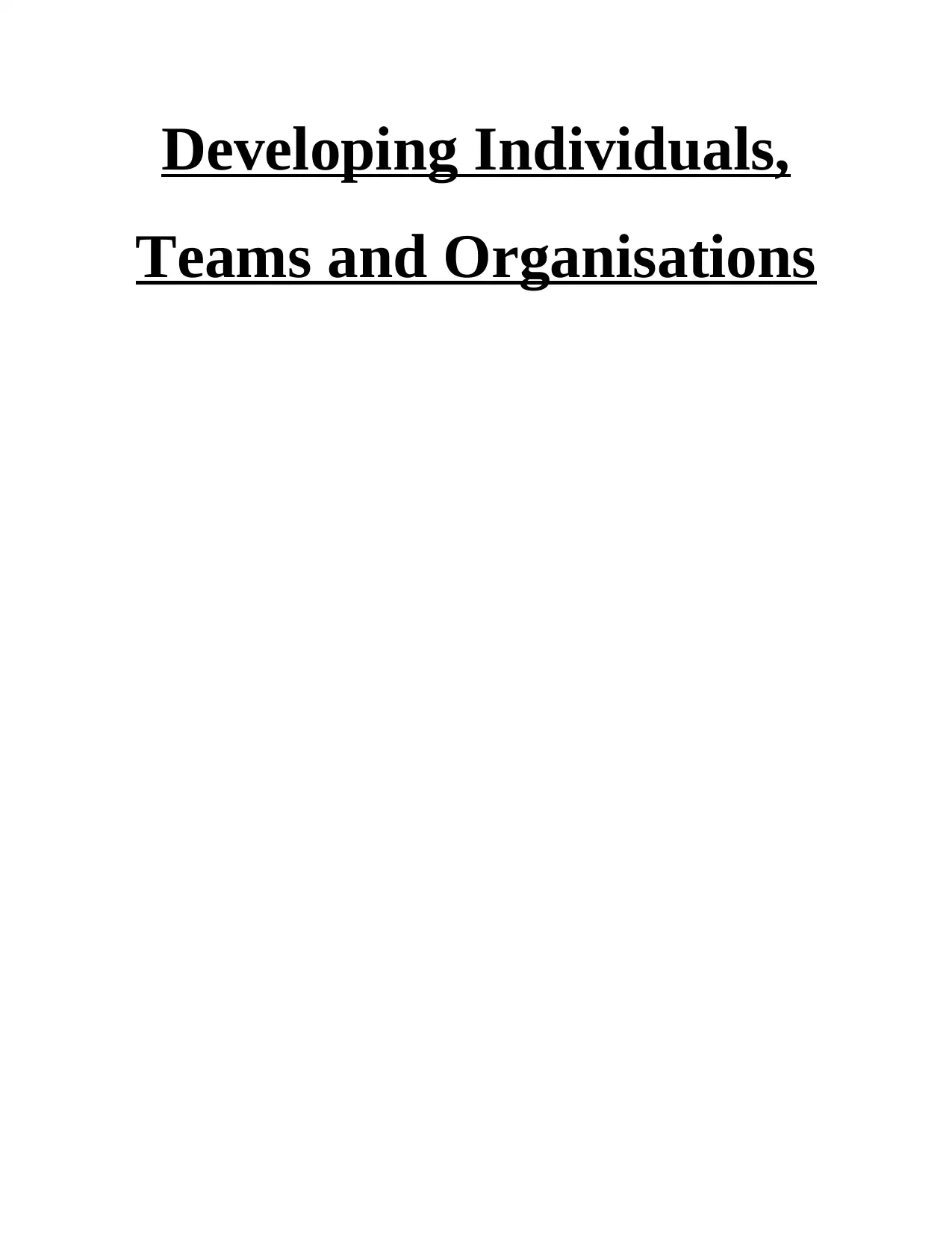
Developing Individuals,
Teams and Organisations
Teams and Organisations
Paraphrase This Document
Need a fresh take? Get an instant paraphrase of this document with our AI Paraphraser
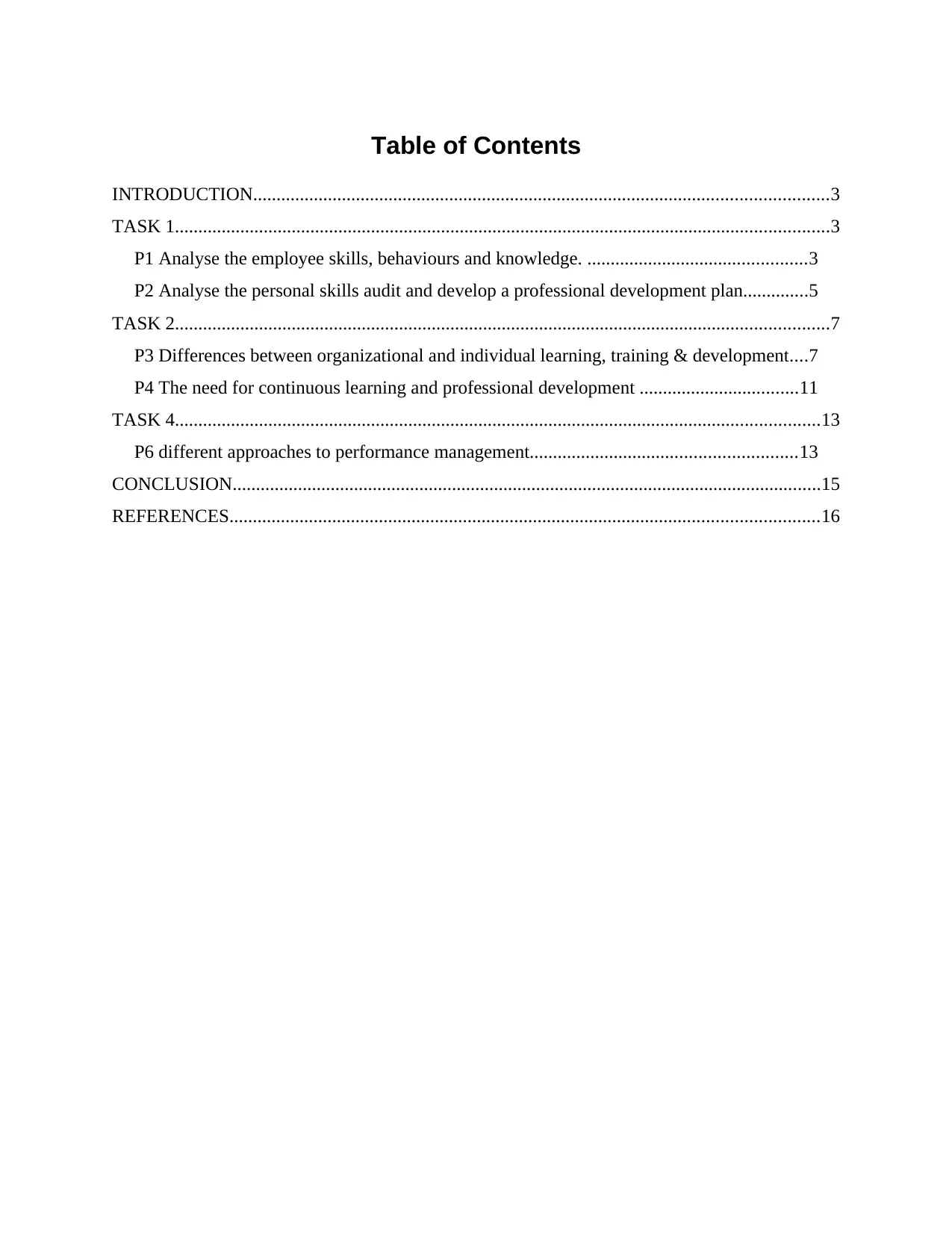
Table of Contents
INTRODUCTION...........................................................................................................................3
TASK 1............................................................................................................................................3
P1 Analyse the employee skills, behaviours and knowledge. ...............................................3
P2 Analyse the personal skills audit and develop a professional development plan..............5
TASK 2............................................................................................................................................7
P3 Differences between organizational and individual learning, training & development....7
P4 The need for continuous learning and professional development ..................................11
TASK 4..........................................................................................................................................13
P6 different approaches to performance management.........................................................13
CONCLUSION..............................................................................................................................15
REFERENCES..............................................................................................................................16
INTRODUCTION...........................................................................................................................3
TASK 1............................................................................................................................................3
P1 Analyse the employee skills, behaviours and knowledge. ...............................................3
P2 Analyse the personal skills audit and develop a professional development plan..............5
TASK 2............................................................................................................................................7
P3 Differences between organizational and individual learning, training & development....7
P4 The need for continuous learning and professional development ..................................11
TASK 4..........................................................................................................................................13
P6 different approaches to performance management.........................................................13
CONCLUSION..............................................................................................................................15
REFERENCES..............................................................................................................................16
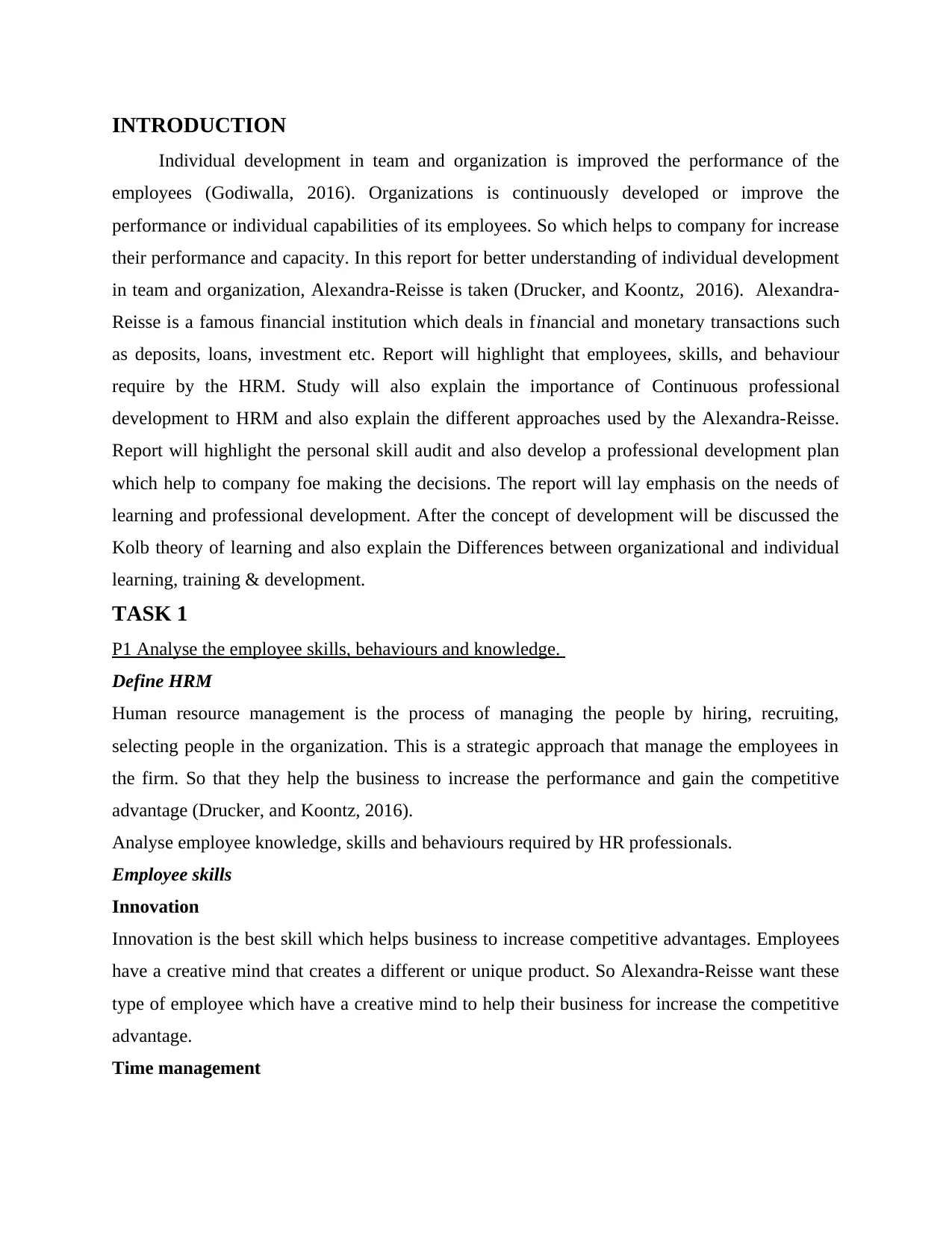
INTRODUCTION
Individual development in team and organization is improved the performance of the
employees (Godiwalla, 2016). Organizations is continuously developed or improve the
performance or individual capabilities of its employees. So which helps to company for increase
their performance and capacity. In this report for better understanding of individual development
in team and organization, Alexandra-Reisse is taken (Drucker, and Koontz, 2016). Alexandra-
Reisse is a famous financial institution which deals in financial and monetary transactions such
as deposits, loans, investment etc. Report will highlight that employees, skills, and behaviour
require by the HRM. Study will also explain the importance of Continuous professional
development to HRM and also explain the different approaches used by the Alexandra-Reisse.
Report will highlight the personal skill audit and also develop a professional development plan
which help to company foe making the decisions. The report will lay emphasis on the needs of
learning and professional development. After the concept of development will be discussed the
Kolb theory of learning and also explain the Differences between organizational and individual
learning, training & development.
TASK 1
P1 Analyse the employee skills, behaviours and knowledge.
Define HRM
Human resource management is the process of managing the people by hiring, recruiting,
selecting people in the organization. This is a strategic approach that manage the employees in
the firm. So that they help the business to increase the performance and gain the competitive
advantage (Drucker, and Koontz, 2016).
Analyse employee knowledge, skills and behaviours required by HR professionals.
Employee skills
Innovation
Innovation is the best skill which helps business to increase competitive advantages. Employees
have a creative mind that creates a different or unique product. So Alexandra-Reisse want these
type of employee which have a creative mind to help their business for increase the competitive
advantage.
Time management
Individual development in team and organization is improved the performance of the
employees (Godiwalla, 2016). Organizations is continuously developed or improve the
performance or individual capabilities of its employees. So which helps to company for increase
their performance and capacity. In this report for better understanding of individual development
in team and organization, Alexandra-Reisse is taken (Drucker, and Koontz, 2016). Alexandra-
Reisse is a famous financial institution which deals in financial and monetary transactions such
as deposits, loans, investment etc. Report will highlight that employees, skills, and behaviour
require by the HRM. Study will also explain the importance of Continuous professional
development to HRM and also explain the different approaches used by the Alexandra-Reisse.
Report will highlight the personal skill audit and also develop a professional development plan
which help to company foe making the decisions. The report will lay emphasis on the needs of
learning and professional development. After the concept of development will be discussed the
Kolb theory of learning and also explain the Differences between organizational and individual
learning, training & development.
TASK 1
P1 Analyse the employee skills, behaviours and knowledge.
Define HRM
Human resource management is the process of managing the people by hiring, recruiting,
selecting people in the organization. This is a strategic approach that manage the employees in
the firm. So that they help the business to increase the performance and gain the competitive
advantage (Drucker, and Koontz, 2016).
Analyse employee knowledge, skills and behaviours required by HR professionals.
Employee skills
Innovation
Innovation is the best skill which helps business to increase competitive advantages. Employees
have a creative mind that creates a different or unique product. So Alexandra-Reisse want these
type of employee which have a creative mind to help their business for increase the competitive
advantage.
Time management
⊘ This is a preview!⊘
Do you want full access?
Subscribe today to unlock all pages.

Trusted by 1+ million students worldwide
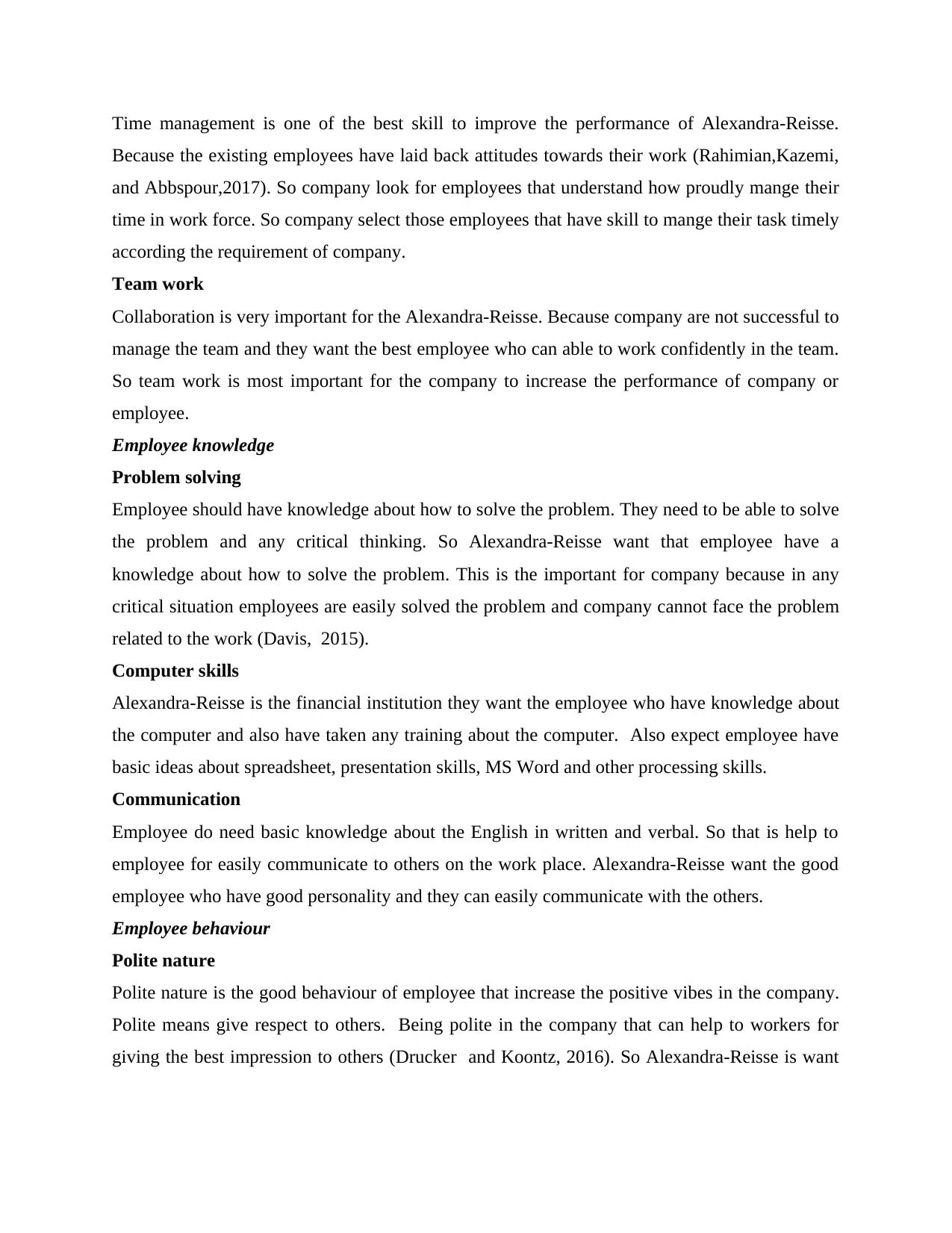
Time management is one of the best skill to improve the performance of Alexandra-Reisse.
Because the existing employees have laid back attitudes towards their work (Rahimian,Kazemi,
and Abbspour,2017). So company look for employees that understand how proudly mange their
time in work force. So company select those employees that have skill to mange their task timely
according the requirement of company.
Team work
Collaboration is very important for the Alexandra-Reisse. Because company are not successful to
manage the team and they want the best employee who can able to work confidently in the team.
So team work is most important for the company to increase the performance of company or
employee.
Employee knowledge
Problem solving
Employee should have knowledge about how to solve the problem. They need to be able to solve
the problem and any critical thinking. So Alexandra-Reisse want that employee have a
knowledge about how to solve the problem. This is the important for company because in any
critical situation employees are easily solved the problem and company cannot face the problem
related to the work (Davis, 2015).
Computer skills
Alexandra-Reisse is the financial institution they want the employee who have knowledge about
the computer and also have taken any training about the computer. Also expect employee have
basic ideas about spreadsheet, presentation skills, MS Word and other processing skills.
Communication
Employee do need basic knowledge about the English in written and verbal. So that is help to
employee for easily communicate to others on the work place. Alexandra-Reisse want the good
employee who have good personality and they can easily communicate with the others.
Employee behaviour
Polite nature
Polite nature is the good behaviour of employee that increase the positive vibes in the company.
Polite means give respect to others. Being polite in the company that can help to workers for
giving the best impression to others (Drucker and Koontz, 2016). So Alexandra-Reisse is want
Because the existing employees have laid back attitudes towards their work (Rahimian,Kazemi,
and Abbspour,2017). So company look for employees that understand how proudly mange their
time in work force. So company select those employees that have skill to mange their task timely
according the requirement of company.
Team work
Collaboration is very important for the Alexandra-Reisse. Because company are not successful to
manage the team and they want the best employee who can able to work confidently in the team.
So team work is most important for the company to increase the performance of company or
employee.
Employee knowledge
Problem solving
Employee should have knowledge about how to solve the problem. They need to be able to solve
the problem and any critical thinking. So Alexandra-Reisse want that employee have a
knowledge about how to solve the problem. This is the important for company because in any
critical situation employees are easily solved the problem and company cannot face the problem
related to the work (Davis, 2015).
Computer skills
Alexandra-Reisse is the financial institution they want the employee who have knowledge about
the computer and also have taken any training about the computer. Also expect employee have
basic ideas about spreadsheet, presentation skills, MS Word and other processing skills.
Communication
Employee do need basic knowledge about the English in written and verbal. So that is help to
employee for easily communicate to others on the work place. Alexandra-Reisse want the good
employee who have good personality and they can easily communicate with the others.
Employee behaviour
Polite nature
Polite nature is the good behaviour of employee that increase the positive vibes in the company.
Polite means give respect to others. Being polite in the company that can help to workers for
giving the best impression to others (Drucker and Koontz, 2016). So Alexandra-Reisse is want
Paraphrase This Document
Need a fresh take? Get an instant paraphrase of this document with our AI Paraphraser
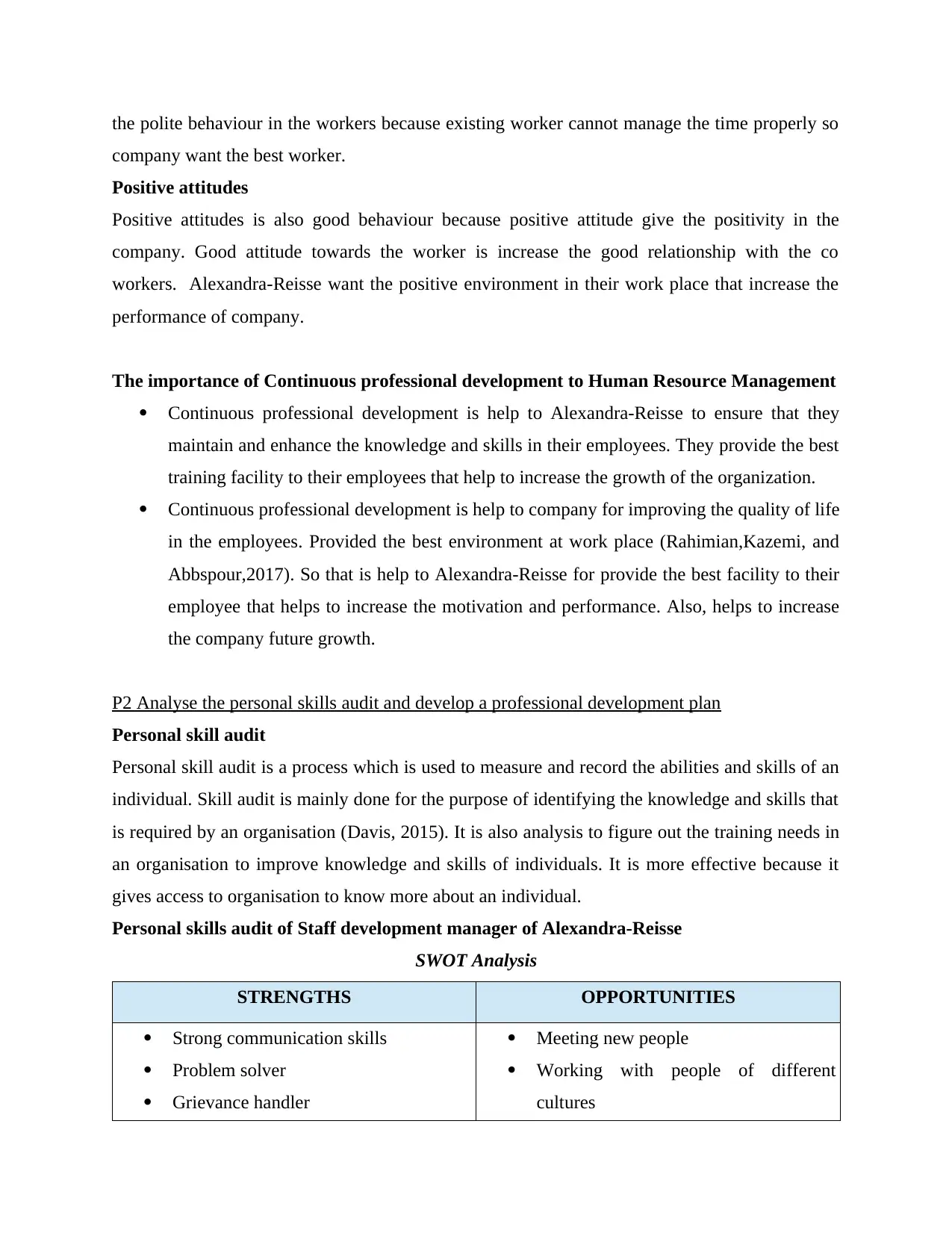
the polite behaviour in the workers because existing worker cannot manage the time properly so
company want the best worker.
Positive attitudes
Positive attitudes is also good behaviour because positive attitude give the positivity in the
company. Good attitude towards the worker is increase the good relationship with the co
workers. Alexandra-Reisse want the positive environment in their work place that increase the
performance of company.
The importance of Continuous professional development to Human Resource Management
Continuous professional development is help to Alexandra-Reisse to ensure that they
maintain and enhance the knowledge and skills in their employees. They provide the best
training facility to their employees that help to increase the growth of the organization.
Continuous professional development is help to company for improving the quality of life
in the employees. Provided the best environment at work place (Rahimian,Kazemi, and
Abbspour,2017). So that is help to Alexandra-Reisse for provide the best facility to their
employee that helps to increase the motivation and performance. Also, helps to increase
the company future growth.
P2 Analyse the personal skills audit and develop a professional development plan
Personal skill audit
Personal skill audit is a process which is used to measure and record the abilities and skills of an
individual. Skill audit is mainly done for the purpose of identifying the knowledge and skills that
is required by an organisation (Davis, 2015). It is also analysis to figure out the training needs in
an organisation to improve knowledge and skills of individuals. It is more effective because it
gives access to organisation to know more about an individual.
Personal skills audit of Staff development manager of Alexandra-Reisse
SWOT Analysis
STRENGTHS OPPORTUNITIES
Strong communication skills
Problem solver
Grievance handler
Meeting new people
Working with people of different
cultures
company want the best worker.
Positive attitudes
Positive attitudes is also good behaviour because positive attitude give the positivity in the
company. Good attitude towards the worker is increase the good relationship with the co
workers. Alexandra-Reisse want the positive environment in their work place that increase the
performance of company.
The importance of Continuous professional development to Human Resource Management
Continuous professional development is help to Alexandra-Reisse to ensure that they
maintain and enhance the knowledge and skills in their employees. They provide the best
training facility to their employees that help to increase the growth of the organization.
Continuous professional development is help to company for improving the quality of life
in the employees. Provided the best environment at work place (Rahimian,Kazemi, and
Abbspour,2017). So that is help to Alexandra-Reisse for provide the best facility to their
employee that helps to increase the motivation and performance. Also, helps to increase
the company future growth.
P2 Analyse the personal skills audit and develop a professional development plan
Personal skill audit
Personal skill audit is a process which is used to measure and record the abilities and skills of an
individual. Skill audit is mainly done for the purpose of identifying the knowledge and skills that
is required by an organisation (Davis, 2015). It is also analysis to figure out the training needs in
an organisation to improve knowledge and skills of individuals. It is more effective because it
gives access to organisation to know more about an individual.
Personal skills audit of Staff development manager of Alexandra-Reisse
SWOT Analysis
STRENGTHS OPPORTUNITIES
Strong communication skills
Problem solver
Grievance handler
Meeting new people
Working with people of different
cultures
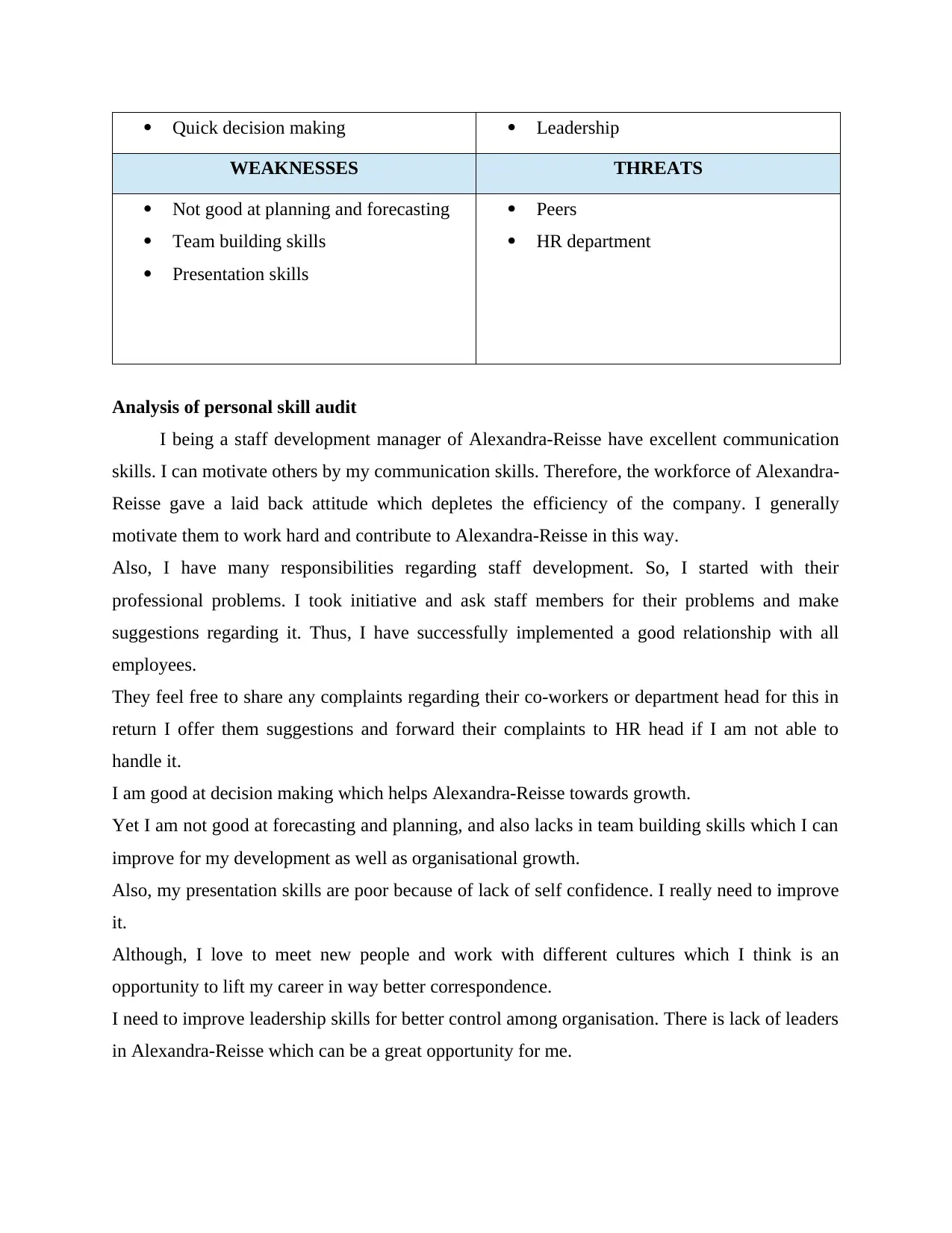
Quick decision making Leadership
WEAKNESSES THREATS
Not good at planning and forecasting
Team building skills
Presentation skills
Peers
HR department
Analysis of personal skill audit
I being a staff development manager of Alexandra-Reisse have excellent communication
skills. I can motivate others by my communication skills. Therefore, the workforce of Alexandra-
Reisse gave a laid back attitude which depletes the efficiency of the company. I generally
motivate them to work hard and contribute to Alexandra-Reisse in this way.
Also, I have many responsibilities regarding staff development. So, I started with their
professional problems. I took initiative and ask staff members for their problems and make
suggestions regarding it. Thus, I have successfully implemented a good relationship with all
employees.
They feel free to share any complaints regarding their co-workers or department head for this in
return I offer them suggestions and forward their complaints to HR head if I am not able to
handle it.
I am good at decision making which helps Alexandra-Reisse towards growth.
Yet I am not good at forecasting and planning, and also lacks in team building skills which I can
improve for my development as well as organisational growth.
Also, my presentation skills are poor because of lack of self confidence. I really need to improve
it.
Although, I love to meet new people and work with different cultures which I think is an
opportunity to lift my career in way better correspondence.
I need to improve leadership skills for better control among organisation. There is lack of leaders
in Alexandra-Reisse which can be a great opportunity for me.
WEAKNESSES THREATS
Not good at planning and forecasting
Team building skills
Presentation skills
Peers
HR department
Analysis of personal skill audit
I being a staff development manager of Alexandra-Reisse have excellent communication
skills. I can motivate others by my communication skills. Therefore, the workforce of Alexandra-
Reisse gave a laid back attitude which depletes the efficiency of the company. I generally
motivate them to work hard and contribute to Alexandra-Reisse in this way.
Also, I have many responsibilities regarding staff development. So, I started with their
professional problems. I took initiative and ask staff members for their problems and make
suggestions regarding it. Thus, I have successfully implemented a good relationship with all
employees.
They feel free to share any complaints regarding their co-workers or department head for this in
return I offer them suggestions and forward their complaints to HR head if I am not able to
handle it.
I am good at decision making which helps Alexandra-Reisse towards growth.
Yet I am not good at forecasting and planning, and also lacks in team building skills which I can
improve for my development as well as organisational growth.
Also, my presentation skills are poor because of lack of self confidence. I really need to improve
it.
Although, I love to meet new people and work with different cultures which I think is an
opportunity to lift my career in way better correspondence.
I need to improve leadership skills for better control among organisation. There is lack of leaders
in Alexandra-Reisse which can be a great opportunity for me.
⊘ This is a preview!⊘
Do you want full access?
Subscribe today to unlock all pages.

Trusted by 1+ million students worldwide
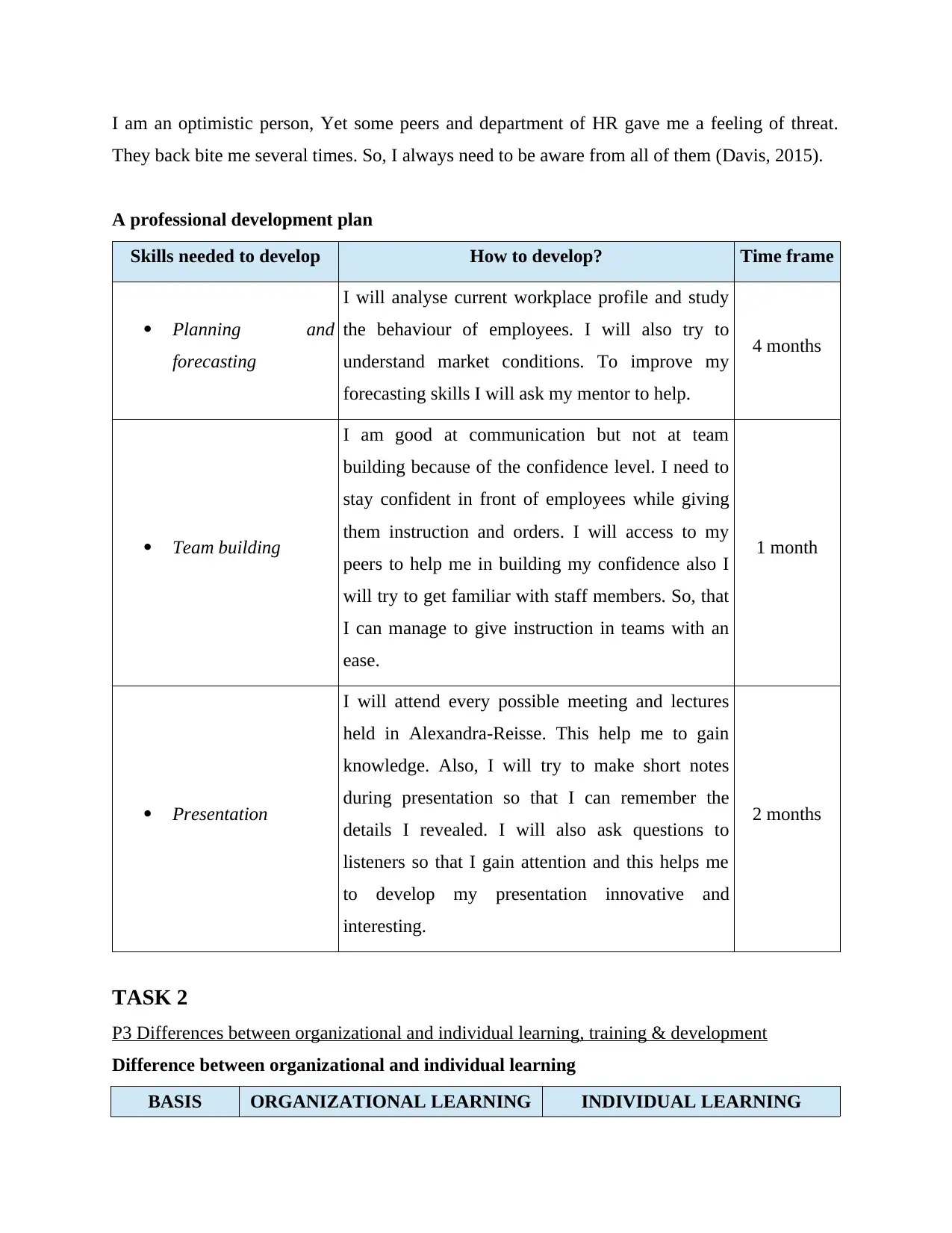
I am an optimistic person, Yet some peers and department of HR gave me a feeling of threat.
They back bite me several times. So, I always need to be aware from all of them (Davis, 2015).
A professional development plan
Skills needed to develop How to develop? Time frame
Planning and
forecasting
I will analyse current workplace profile and study
the behaviour of employees. I will also try to
understand market conditions. To improve my
forecasting skills I will ask my mentor to help.
4 months
Team building
I am good at communication but not at team
building because of the confidence level. I need to
stay confident in front of employees while giving
them instruction and orders. I will access to my
peers to help me in building my confidence also I
will try to get familiar with staff members. So, that
I can manage to give instruction in teams with an
ease.
1 month
Presentation
I will attend every possible meeting and lectures
held in Alexandra-Reisse. This help me to gain
knowledge. Also, I will try to make short notes
during presentation so that I can remember the
details I revealed. I will also ask questions to
listeners so that I gain attention and this helps me
to develop my presentation innovative and
interesting.
2 months
TASK 2
P3 Differences between organizational and individual learning, training & development
Difference between organizational and individual learning
BASIS ORGANIZATIONAL LEARNING INDIVIDUAL LEARNING
They back bite me several times. So, I always need to be aware from all of them (Davis, 2015).
A professional development plan
Skills needed to develop How to develop? Time frame
Planning and
forecasting
I will analyse current workplace profile and study
the behaviour of employees. I will also try to
understand market conditions. To improve my
forecasting skills I will ask my mentor to help.
4 months
Team building
I am good at communication but not at team
building because of the confidence level. I need to
stay confident in front of employees while giving
them instruction and orders. I will access to my
peers to help me in building my confidence also I
will try to get familiar with staff members. So, that
I can manage to give instruction in teams with an
ease.
1 month
Presentation
I will attend every possible meeting and lectures
held in Alexandra-Reisse. This help me to gain
knowledge. Also, I will try to make short notes
during presentation so that I can remember the
details I revealed. I will also ask questions to
listeners so that I gain attention and this helps me
to develop my presentation innovative and
interesting.
2 months
TASK 2
P3 Differences between organizational and individual learning, training & development
Difference between organizational and individual learning
BASIS ORGANIZATIONAL LEARNING INDIVIDUAL LEARNING
Paraphrase This Document
Need a fresh take? Get an instant paraphrase of this document with our AI Paraphraser
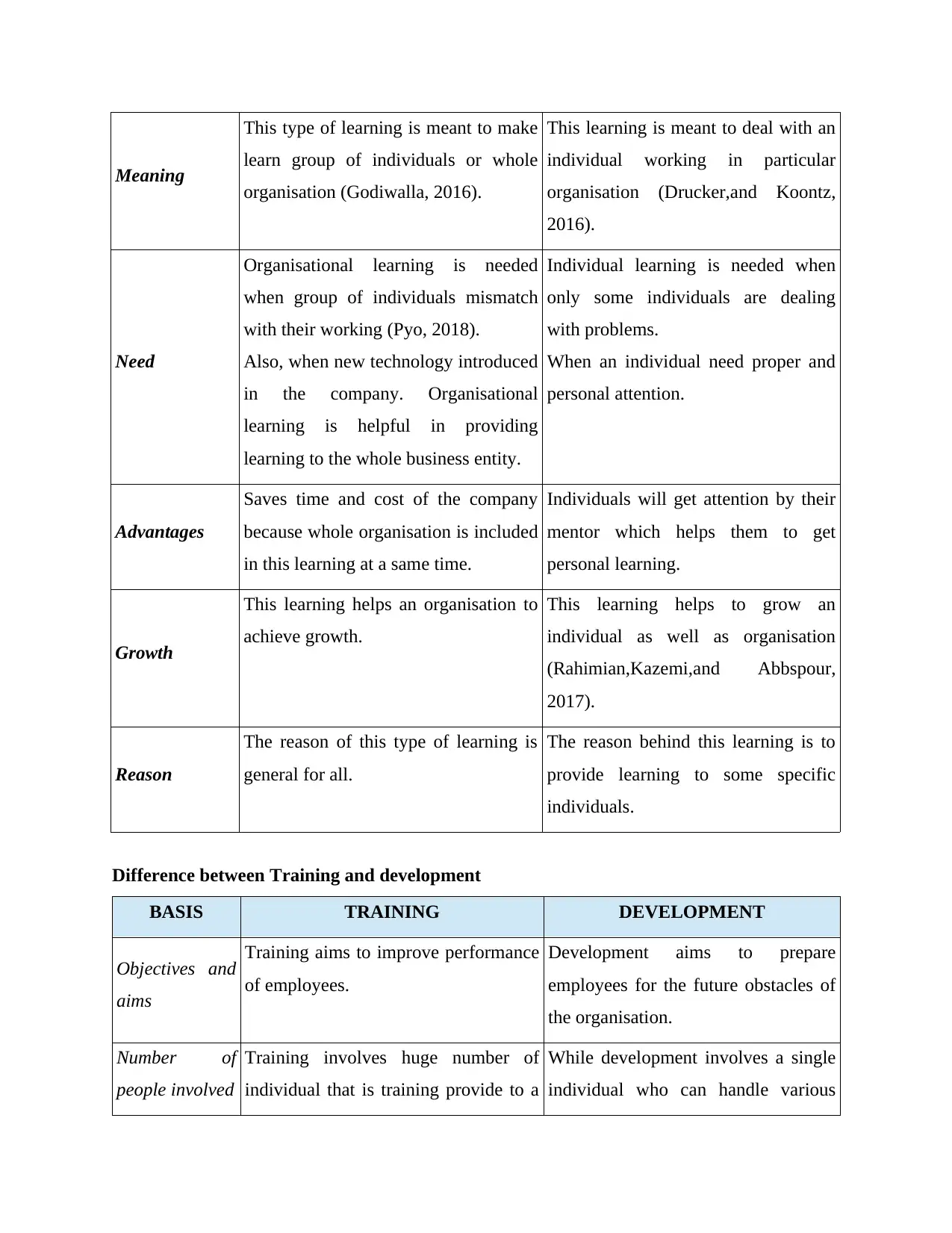
Meaning
This type of learning is meant to make
learn group of individuals or whole
organisation (Godiwalla, 2016).
This learning is meant to deal with an
individual working in particular
organisation (Drucker,and Koontz,
2016).
Need
Organisational learning is needed
when group of individuals mismatch
with their working (Pyo, 2018).
Also, when new technology introduced
in the company. Organisational
learning is helpful in providing
learning to the whole business entity.
Individual learning is needed when
only some individuals are dealing
with problems.
When an individual need proper and
personal attention.
Advantages
Saves time and cost of the company
because whole organisation is included
in this learning at a same time.
Individuals will get attention by their
mentor which helps them to get
personal learning.
Growth
This learning helps an organisation to
achieve growth.
This learning helps to grow an
individual as well as organisation
(Rahimian,Kazemi,and Abbspour,
2017).
Reason
The reason of this type of learning is
general for all.
The reason behind this learning is to
provide learning to some specific
individuals.
Difference between Training and development
BASIS TRAINING DEVELOPMENT
Objectives and
aims
Training aims to improve performance
of employees.
Development aims to prepare
employees for the future obstacles of
the organisation.
Number of
people involved
Training involves huge number of
individual that is training provide to a
While development involves a single
individual who can handle various
This type of learning is meant to make
learn group of individuals or whole
organisation (Godiwalla, 2016).
This learning is meant to deal with an
individual working in particular
organisation (Drucker,and Koontz,
2016).
Need
Organisational learning is needed
when group of individuals mismatch
with their working (Pyo, 2018).
Also, when new technology introduced
in the company. Organisational
learning is helpful in providing
learning to the whole business entity.
Individual learning is needed when
only some individuals are dealing
with problems.
When an individual need proper and
personal attention.
Advantages
Saves time and cost of the company
because whole organisation is included
in this learning at a same time.
Individuals will get attention by their
mentor which helps them to get
personal learning.
Growth
This learning helps an organisation to
achieve growth.
This learning helps to grow an
individual as well as organisation
(Rahimian,Kazemi,and Abbspour,
2017).
Reason
The reason of this type of learning is
general for all.
The reason behind this learning is to
provide learning to some specific
individuals.
Difference between Training and development
BASIS TRAINING DEVELOPMENT
Objectives and
aims
Training aims to improve performance
of employees.
Development aims to prepare
employees for the future obstacles of
the organisation.
Number of
people involved
Training involves huge number of
individual that is training provide to a
While development involves a single
individual who can handle various
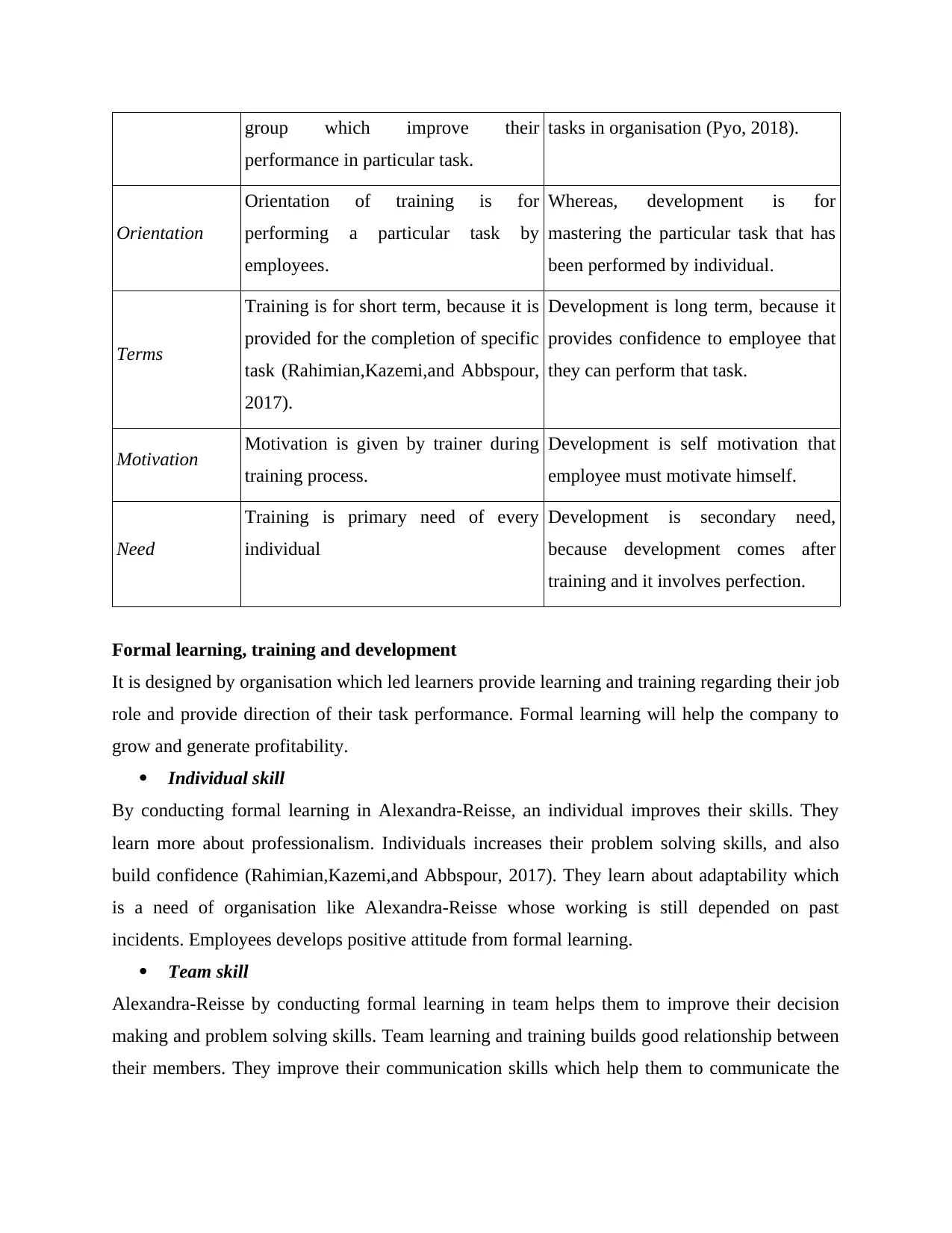
group which improve their
performance in particular task.
tasks in organisation (Pyo, 2018).
Orientation
Orientation of training is for
performing a particular task by
employees.
Whereas, development is for
mastering the particular task that has
been performed by individual.
Terms
Training is for short term, because it is
provided for the completion of specific
task (Rahimian,Kazemi,and Abbspour,
2017).
Development is long term, because it
provides confidence to employee that
they can perform that task.
Motivation Motivation is given by trainer during
training process.
Development is self motivation that
employee must motivate himself.
Need
Training is primary need of every
individual
Development is secondary need,
because development comes after
training and it involves perfection.
Formal learning, training and development
It is designed by organisation which led learners provide learning and training regarding their job
role and provide direction of their task performance. Formal learning will help the company to
grow and generate profitability.
Individual skill
By conducting formal learning in Alexandra-Reisse, an individual improves their skills. They
learn more about professionalism. Individuals increases their problem solving skills, and also
build confidence (Rahimian,Kazemi,and Abbspour, 2017). They learn about adaptability which
is a need of organisation like Alexandra-Reisse whose working is still depended on past
incidents. Employees develops positive attitude from formal learning.
Team skill
Alexandra-Reisse by conducting formal learning in team helps them to improve their decision
making and problem solving skills. Team learning and training builds good relationship between
their members. They improve their communication skills which help them to communicate the
performance in particular task.
tasks in organisation (Pyo, 2018).
Orientation
Orientation of training is for
performing a particular task by
employees.
Whereas, development is for
mastering the particular task that has
been performed by individual.
Terms
Training is for short term, because it is
provided for the completion of specific
task (Rahimian,Kazemi,and Abbspour,
2017).
Development is long term, because it
provides confidence to employee that
they can perform that task.
Motivation Motivation is given by trainer during
training process.
Development is self motivation that
employee must motivate himself.
Need
Training is primary need of every
individual
Development is secondary need,
because development comes after
training and it involves perfection.
Formal learning, training and development
It is designed by organisation which led learners provide learning and training regarding their job
role and provide direction of their task performance. Formal learning will help the company to
grow and generate profitability.
Individual skill
By conducting formal learning in Alexandra-Reisse, an individual improves their skills. They
learn more about professionalism. Individuals increases their problem solving skills, and also
build confidence (Rahimian,Kazemi,and Abbspour, 2017). They learn about adaptability which
is a need of organisation like Alexandra-Reisse whose working is still depended on past
incidents. Employees develops positive attitude from formal learning.
Team skill
Alexandra-Reisse by conducting formal learning in team helps them to improve their decision
making and problem solving skills. Team learning and training builds good relationship between
their members. They improve their communication skills which help them to communicate the
⊘ This is a preview!⊘
Do you want full access?
Subscribe today to unlock all pages.

Trusted by 1+ million students worldwide
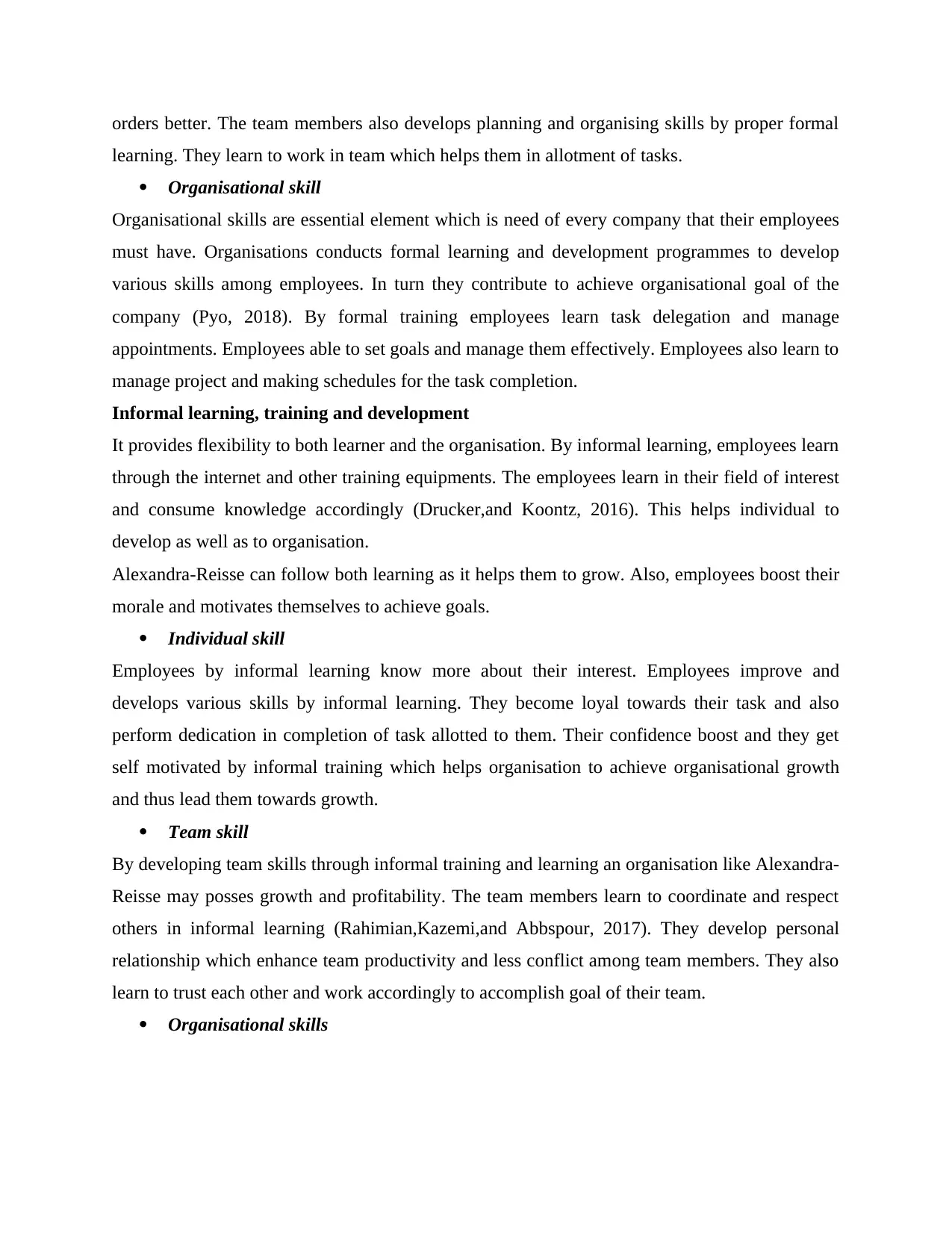
orders better. The team members also develops planning and organising skills by proper formal
learning. They learn to work in team which helps them in allotment of tasks.
Organisational skill
Organisational skills are essential element which is need of every company that their employees
must have. Organisations conducts formal learning and development programmes to develop
various skills among employees. In turn they contribute to achieve organisational goal of the
company (Pyo, 2018). By formal training employees learn task delegation and manage
appointments. Employees able to set goals and manage them effectively. Employees also learn to
manage project and making schedules for the task completion.
Informal learning, training and development
It provides flexibility to both learner and the organisation. By informal learning, employees learn
through the internet and other training equipments. The employees learn in their field of interest
and consume knowledge accordingly (Drucker,and Koontz, 2016). This helps individual to
develop as well as to organisation.
Alexandra-Reisse can follow both learning as it helps them to grow. Also, employees boost their
morale and motivates themselves to achieve goals.
Individual skill
Employees by informal learning know more about their interest. Employees improve and
develops various skills by informal learning. They become loyal towards their task and also
perform dedication in completion of task allotted to them. Their confidence boost and they get
self motivated by informal training which helps organisation to achieve organisational growth
and thus lead them towards growth.
Team skill
By developing team skills through informal training and learning an organisation like Alexandra-
Reisse may posses growth and profitability. The team members learn to coordinate and respect
others in informal learning (Rahimian,Kazemi,and Abbspour, 2017). They develop personal
relationship which enhance team productivity and less conflict among team members. They also
learn to trust each other and work accordingly to accomplish goal of their team.
Organisational skills
learning. They learn to work in team which helps them in allotment of tasks.
Organisational skill
Organisational skills are essential element which is need of every company that their employees
must have. Organisations conducts formal learning and development programmes to develop
various skills among employees. In turn they contribute to achieve organisational goal of the
company (Pyo, 2018). By formal training employees learn task delegation and manage
appointments. Employees able to set goals and manage them effectively. Employees also learn to
manage project and making schedules for the task completion.
Informal learning, training and development
It provides flexibility to both learner and the organisation. By informal learning, employees learn
through the internet and other training equipments. The employees learn in their field of interest
and consume knowledge accordingly (Drucker,and Koontz, 2016). This helps individual to
develop as well as to organisation.
Alexandra-Reisse can follow both learning as it helps them to grow. Also, employees boost their
morale and motivates themselves to achieve goals.
Individual skill
Employees by informal learning know more about their interest. Employees improve and
develops various skills by informal learning. They become loyal towards their task and also
perform dedication in completion of task allotted to them. Their confidence boost and they get
self motivated by informal training which helps organisation to achieve organisational growth
and thus lead them towards growth.
Team skill
By developing team skills through informal training and learning an organisation like Alexandra-
Reisse may posses growth and profitability. The team members learn to coordinate and respect
others in informal learning (Rahimian,Kazemi,and Abbspour, 2017). They develop personal
relationship which enhance team productivity and less conflict among team members. They also
learn to trust each other and work accordingly to accomplish goal of their team.
Organisational skills
Paraphrase This Document
Need a fresh take? Get an instant paraphrase of this document with our AI Paraphraser
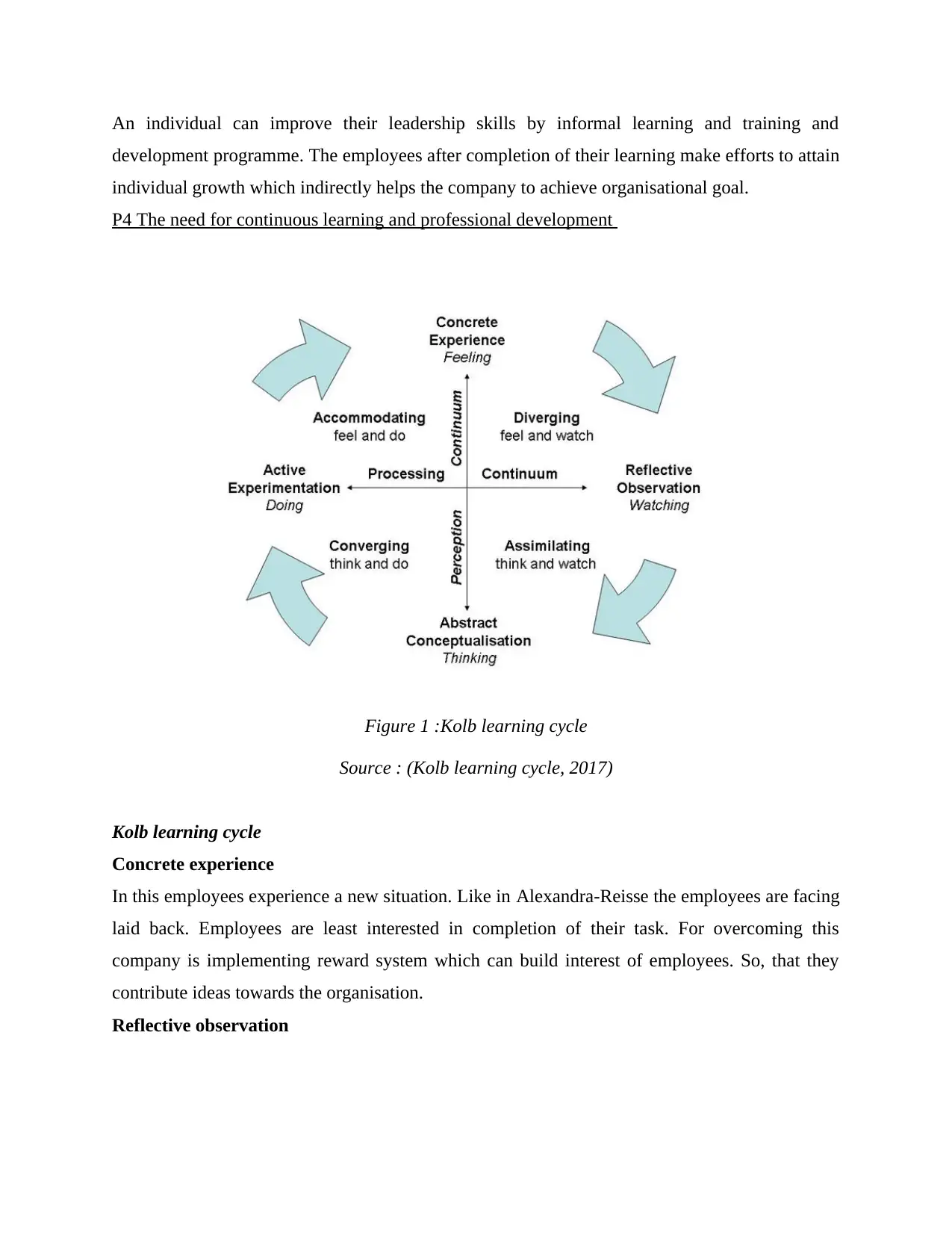
An individual can improve their leadership skills by informal learning and training and
development programme. The employees after completion of their learning make efforts to attain
individual growth which indirectly helps the company to achieve organisational goal.
P4 The need for continuous learning and professional development
Kolb learning cycle
Concrete experience
In this employees experience a new situation. Like in Alexandra-Reisse the employees are facing
laid back. Employees are least interested in completion of their task. For overcoming this
company is implementing reward system which can build interest of employees. So, that they
contribute ideas towards the organisation.
Reflective observation
Figure 1 :Kolb learning cycle
Source : (Kolb learning cycle, 2017)
development programme. The employees after completion of their learning make efforts to attain
individual growth which indirectly helps the company to achieve organisational goal.
P4 The need for continuous learning and professional development
Kolb learning cycle
Concrete experience
In this employees experience a new situation. Like in Alexandra-Reisse the employees are facing
laid back. Employees are least interested in completion of their task. For overcoming this
company is implementing reward system which can build interest of employees. So, that they
contribute ideas towards the organisation.
Reflective observation
Figure 1 :Kolb learning cycle
Source : (Kolb learning cycle, 2017)
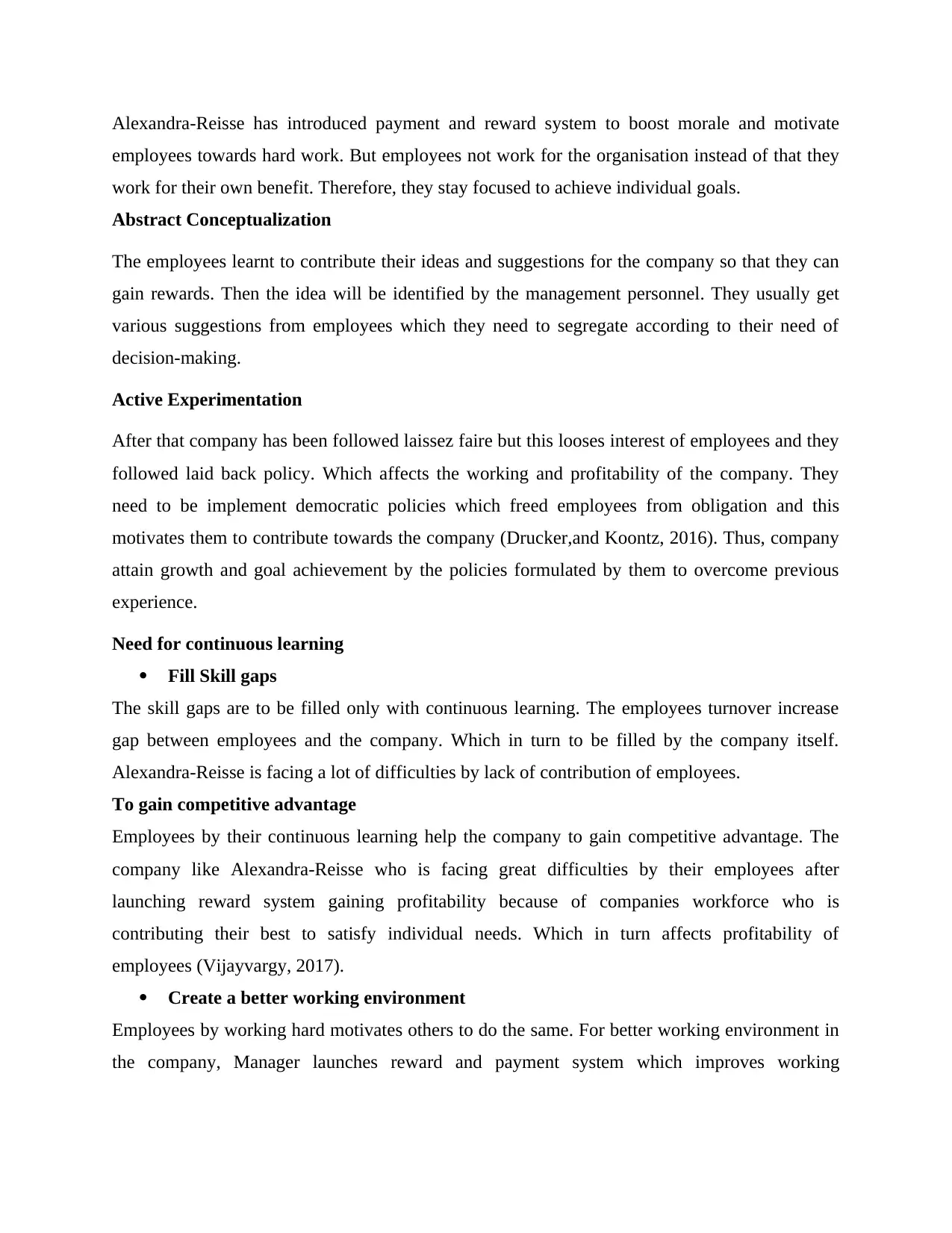
Alexandra-Reisse has introduced payment and reward system to boost morale and motivate
employees towards hard work. But employees not work for the organisation instead of that they
work for their own benefit. Therefore, they stay focused to achieve individual goals.
Abstract Conceptualization
The employees learnt to contribute their ideas and suggestions for the company so that they can
gain rewards. Then the idea will be identified by the management personnel. They usually get
various suggestions from employees which they need to segregate according to their need of
decision-making.
Active Experimentation
After that company has been followed laissez faire but this looses interest of employees and they
followed laid back policy. Which affects the working and profitability of the company. They
need to be implement democratic policies which freed employees from obligation and this
motivates them to contribute towards the company (Drucker,and Koontz, 2016). Thus, company
attain growth and goal achievement by the policies formulated by them to overcome previous
experience.
Need for continuous learning
Fill Skill gaps
The skill gaps are to be filled only with continuous learning. The employees turnover increase
gap between employees and the company. Which in turn to be filled by the company itself.
Alexandra-Reisse is facing a lot of difficulties by lack of contribution of employees.
To gain competitive advantage
Employees by their continuous learning help the company to gain competitive advantage. The
company like Alexandra-Reisse who is facing great difficulties by their employees after
launching reward system gaining profitability because of companies workforce who is
contributing their best to satisfy individual needs. Which in turn affects profitability of
employees (Vijayvargy, 2017).
Create a better working environment
Employees by working hard motivates others to do the same. For better working environment in
the company, Manager launches reward and payment system which improves working
employees towards hard work. But employees not work for the organisation instead of that they
work for their own benefit. Therefore, they stay focused to achieve individual goals.
Abstract Conceptualization
The employees learnt to contribute their ideas and suggestions for the company so that they can
gain rewards. Then the idea will be identified by the management personnel. They usually get
various suggestions from employees which they need to segregate according to their need of
decision-making.
Active Experimentation
After that company has been followed laissez faire but this looses interest of employees and they
followed laid back policy. Which affects the working and profitability of the company. They
need to be implement democratic policies which freed employees from obligation and this
motivates them to contribute towards the company (Drucker,and Koontz, 2016). Thus, company
attain growth and goal achievement by the policies formulated by them to overcome previous
experience.
Need for continuous learning
Fill Skill gaps
The skill gaps are to be filled only with continuous learning. The employees turnover increase
gap between employees and the company. Which in turn to be filled by the company itself.
Alexandra-Reisse is facing a lot of difficulties by lack of contribution of employees.
To gain competitive advantage
Employees by their continuous learning help the company to gain competitive advantage. The
company like Alexandra-Reisse who is facing great difficulties by their employees after
launching reward system gaining profitability because of companies workforce who is
contributing their best to satisfy individual needs. Which in turn affects profitability of
employees (Vijayvargy, 2017).
Create a better working environment
Employees by working hard motivates others to do the same. For better working environment in
the company, Manager launches reward and payment system which improves working
⊘ This is a preview!⊘
Do you want full access?
Subscribe today to unlock all pages.

Trusted by 1+ million students worldwide
1 out of 16
Related Documents
Your All-in-One AI-Powered Toolkit for Academic Success.
+13062052269
info@desklib.com
Available 24*7 on WhatsApp / Email
![[object Object]](/_next/static/media/star-bottom.7253800d.svg)
Unlock your academic potential
Copyright © 2020–2026 A2Z Services. All Rights Reserved. Developed and managed by ZUCOL.



